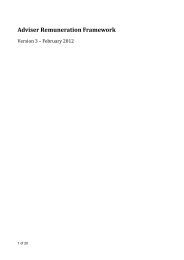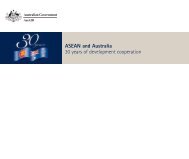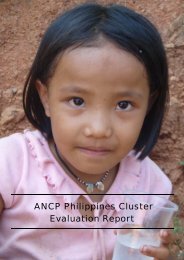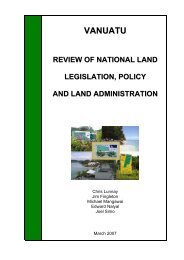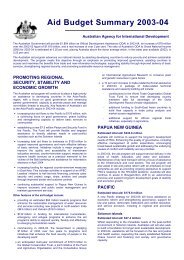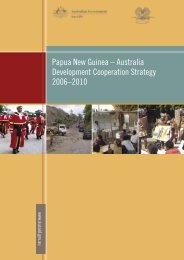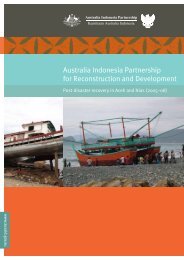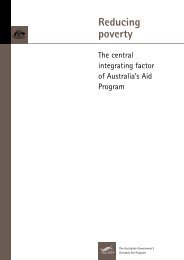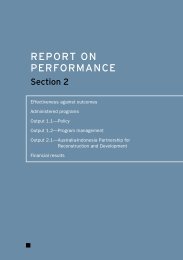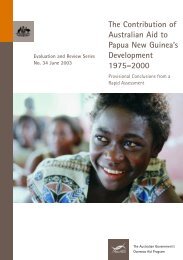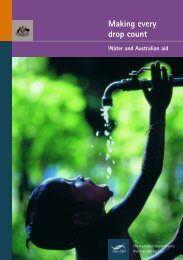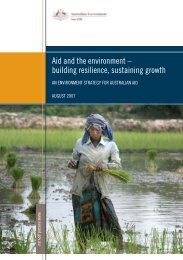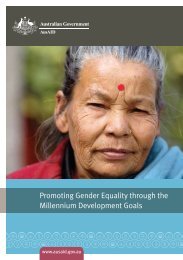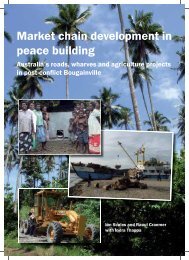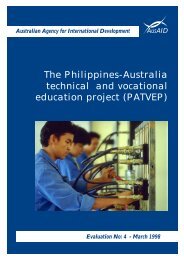AusAID Annual Report 2000-2001
AusAID Annual Report 2000-2001
AusAID Annual Report 2000-2001
You also want an ePaper? Increase the reach of your titles
YUMPU automatically turns print PDFs into web optimized ePapers that Google loves.
APPENDIXES<br />
section 5<br />
appendixes
MINISTERIAL RESPONSIBILITIES<br />
APPENDIXES<br />
1. MINISTERIAL RESPONSIBILITIES<br />
Minister for Foreign Affairs, the Hon. Alexander Downer, MP<br />
Mr Downer has overall responsibility for the portfolio, including<br />
the department’s administration and management, and all<br />
non-trade international political, multilateral and legal issues<br />
(including the treaty-making process), consular and passport<br />
functions, and development assistance matters. In addition,<br />
he is responsible for all human rights, arms control and<br />
disarmament issues, peacekeeping, and the non-trade related<br />
aspects of the UN system. Mr Downer shares responsibility<br />
for international security issues with the Minister for<br />
Defence. International environment issues, while primarily the<br />
responsibility of the Minister for Foreign Affairs, often require close consultation and<br />
occasionally joint decision by both portfolio ministers. Mr Downer has primary carriage<br />
of non-trade related public affairs activities and questions of protocol. He also<br />
has responsibility for the administration and management of <strong>AusAID</strong>, the Australian<br />
Secret Intelligence Service, the Australian Safeguards and Non-Proliferation Office,<br />
the Australian Centre for International Agricultural Research, and the Australia–Japan<br />
Foundation.<br />
Minister for Trade, the Hon. Mark Vaile, MP<br />
Mr Vaile is responsible for all trade matters—bilateral, regional<br />
and multilateral—and has responsibility for Austrade, the<br />
Export Market Development Grants Scheme and the Export<br />
Finance and Insurance Corporation (EFIC). Regional trade<br />
interests include APEC and the ASEAN Free Trade Area–Closer<br />
Economic Relations (AFTA–CER). Multilateral interests include<br />
the WTO and OECD. Mr Vaile consults sectoral ministers,<br />
State and Territory Governments and industry to ensure<br />
that the Government’s international trade efforts are effective<br />
and aimed at improving Australia’s export and investment<br />
performance. As part of his travel overseas to promote and advance Australian trade and<br />
commercial interests, Mr Vaile often leads industry missions.<br />
150 AUSAid <strong>Annual</strong> <strong>Report</strong> <strong>2000</strong>–<strong>2001</strong>
APPENDIXES<br />
MINISTERIAL RESPONSIBILITIES<br />
Parliamentary Secretary to the Minister for Foreign Affairs,<br />
Senator the Hon. Kay Patterson<br />
Senator Patterson is responsible for the day-to-day<br />
management of issues related to the aid program and<br />
provides assistance to Mr Downer in carrying out his<br />
responsibility for aid policy. Senator Patterson is actively<br />
involved in encouraging an understanding of Australia’s<br />
official development cooperation program among the wider<br />
community. She liaises closely with the non-government<br />
organisation (NGO) community, business groups and other key<br />
stakeholders in relation to overseas aid. Senator Patterson<br />
is the Government’s Special Representative on Demining,<br />
which involves representing Australia at relevant conferences. Senator Patterson is also<br />
strongly engaged in promoting recognition of the efforts of Australian volunteers in<br />
developing countries.<br />
Further information about the ministers and the Parliamentary Secretary is available<br />
from the Internet website http://www.ausaid.gov.au/minister<br />
AUSAid <strong>Annual</strong> <strong>Report</strong> <strong>2000</strong>–<strong>2001</strong><br />
151
STAFFING OVERVIEW<br />
APPENDIXES<br />
2. STAFFING OVERVIEW<br />
Table 2. Employees by classification, location and gender as at<br />
30 June <strong>2001</strong><br />
Female<br />
Male<br />
Australia Overseas Australia Overseas Total staff<br />
GAPS 8 0 5 0 13<br />
APS1 3 0 1 0 4<br />
APS2 6 0 5 0 11<br />
APS3 21 0 11 0 32<br />
APS4 17 0 6 0 23<br />
APS5 41 2 29 0 72<br />
APS6 81 13 66 6 166<br />
EL1 52 11 79 17 159<br />
EL2 13 6 28 6 53<br />
SES 3 1 12 0 16<br />
Total 245 33 242 29 549<br />
Table 3. Ongoing and non-ongoing employees, full-time and part-time<br />
All under the Public Service Act 1999<br />
Ongoing<br />
Non-ongoing<br />
Full-time Part-time Sub-total Full-time Part-time Sub-total Total<br />
Male 264 5 269 2 0 2 271<br />
Female 247 25 272 4 2 6 278<br />
Total 511 30 541 6 2 8 549<br />
152 AUSAid <strong>Annual</strong> <strong>Report</strong> <strong>2000</strong>–<strong>2001</strong>
APPENDIXES<br />
STAFFING OVERVIEW<br />
Table 4. Senior Executive Service gains and losses during <strong>2000</strong>–01<br />
Category<br />
Number of staff<br />
Commencements 1<br />
Separations 3<br />
Note: These figures do not include SES staff currently inoperative<br />
Table 5. Senior Executive Service as at 30 June <strong>2001</strong><br />
Female<br />
Male<br />
Australia Overseas Australia Overseas Total staff<br />
SES Band 1 2 1 9 0 12<br />
SES Band 2 1 0 2 0 3<br />
SES Band 3 0 0 1 0 1<br />
Total 3 1 12 0 16<br />
Notes: These figures do not include SES staff currently inoperative, and are based on actual occupancy of<br />
positions at 30 June <strong>2001</strong>.<br />
There were no inter-agency SES moves to or from <strong>AusAID</strong> in <strong>2000</strong>–01.<br />
AUSAid <strong>Annual</strong> <strong>Report</strong> <strong>2000</strong>–<strong>2001</strong><br />
153
STAFFING OVERVIEW<br />
APPENDIXES<br />
Table 6. <strong>AusAID</strong> employees by location and gender as at 30 June <strong>2001</strong><br />
Male Female Total<br />
Australia 242 245 487<br />
Posts<br />
Apia 1 0 1<br />
Bangkok 2 0 2<br />
Beijing 0 3 3<br />
Colombo 1 0 1<br />
Dhaka 0 1 1<br />
Dili 1 2 3<br />
Geneva 1 0 1<br />
Hanoi 0 4 4<br />
Ho Chi Minh City 1 0 1<br />
Honiara 1 1 2<br />
Jakarta 2 5 7<br />
Manila 2 1 3<br />
New Delhi 2 0 2<br />
New York 0 1 1<br />
Nuku’alofa 0 1 1<br />
Paris 1 0 1<br />
Phnom Penh 1 1 2<br />
Port Moresby 8 9 17<br />
Port Vila 1 0 1<br />
Pretoria 0 3 3<br />
Suva 2 1 3<br />
Tarawa 1 0 1<br />
Vientiane 1 0 1<br />
Sub-total 29 33 62<br />
Total 271 278 549<br />
154 AUSAid <strong>Annual</strong> <strong>Report</strong> <strong>2000</strong>–<strong>2001</strong>
APPENDIXES<br />
STAFFING OVERVIEW<br />
Table 7. <strong>AusAID</strong> Certified Agreement salary ranges as at 30 June <strong>2001</strong><br />
Staff level<br />
Salary band<br />
APS 1 $25 920–$28 639<br />
APS 2 $29 139–$32 519<br />
APS 3 & GAPS $33 112–$36 049<br />
APS 4 $37 136–$40 420<br />
APS 5 $41 489–$44 028<br />
APS 6 $44 496–$51 514<br />
EL 1 $58 104–$61 660<br />
EL 2 $70 247–$74 547<br />
Note: <strong>AusAID</strong> had one non-SES employee on an AWA at 30 June <strong>2001</strong>. The salary has not been provided, as it<br />
would breach the privacy of the individual concerned.<br />
Table 8. <strong>AusAID</strong> SES employee salary ranges as at 30 June <strong>2001</strong><br />
Band Salary range No. of persons<br />
SES Band 1 $90 000–$100 000 10<br />
SES Band 2–3 $110 000–$150 000 4<br />
Note: All SES are on AWAs<br />
Note: Only includes substantive SES employees<br />
Table 9. Expenditure on formal training activities<br />
Total expenditure including<br />
Average expenditure including<br />
salary $1 048 285 salary per person $1 909<br />
Total expenditure excluding<br />
Average expenditure excluding<br />
salary $621 102 salary per person $1 131<br />
Total formal training<br />
Average formal training days<br />
days 2 452 per person 4.47<br />
Note: The average figures above are based on a total of 549 staff in the agency.<br />
AUSAid <strong>Annual</strong> <strong>Report</strong> <strong>2000</strong>–<strong>2001</strong><br />
155
STAFFING OVERVIEW<br />
APPENDIXES<br />
Table 10. Expenditure on additional training and development activities<br />
No. of participants<br />
Cost<br />
Study Support Scheme 74 $79 992<br />
Language training at posts No. of participants Cost<br />
12 $20 887<br />
Work unit planning sessions No. of sessions Cost<br />
31 $68 815<br />
Staff training conducted overseas * No. of posts Total cost<br />
Pacific 8<br />
Asia 3<br />
Total cost $41 000<br />
* Overseas staff training includes both Program Support Unit and Australia-based staff.<br />
Table 11. Breakdown of the five priority training activities<br />
Contract<br />
project/<br />
program Manager Systems Language Financial<br />
Category training development training training** training<br />
Total training expenditure<br />
including salary $329 753 $178 859 $120 577 $81 599 $27 529<br />
Total training expenditure<br />
excluding salary $196 890 $136 476 $66 693 $61 577 $17 534<br />
Total training days 738 190 315 231 57<br />
Total number of attendees 548 131 522 182 79<br />
** Refers to language training activities undertaken in Australia.<br />
156 AUSAid <strong>Annual</strong> <strong>Report</strong> <strong>2000</strong>–<strong>2001</strong>
APPENDIXES<br />
STAFFING OVERVIEW<br />
Table 12. Workplace diversity: representation of groups within levels<br />
Culturally and Aboriginal<br />
linguistically and Torres<br />
diverse Strait People with<br />
Level Total staff Female backgrounds* Islanders* disabilities*<br />
No. % No. % No. % No. %<br />
APS 1 4 3 75 2 50 0 0 2 50<br />
APS 2 11 6 55 3 27 0 0 0 0<br />
GAPS 13 8 62 2 15 2 15 0 0<br />
APS 3 32 21 66 8 25 1 3 3 9<br />
APS 4 23 17 74 4 17 0 0 2 9<br />
APS 5 72 43 60 11 15 2 3 5 7<br />
APS 6 166 94 57 32 19 1 1 6 4<br />
EL 1 159 63 40 24 15 1 1 4 3<br />
EL 2 53 19 36 8 15 0 0 3 6<br />
SES 16 4 25 0 0 0 0 1 7<br />
TOTAL 549 278 51 94 17 7 1 26 5<br />
* Note: Identifies people who have volunteered information.<br />
AUSAid <strong>Annual</strong> <strong>Report</strong> <strong>2000</strong>–<strong>2001</strong><br />
157
STAFFING OVERVIEW<br />
APPENDIXES<br />
Table 13. Workplace diversity: engagement by level<br />
Culturally and Aboriginal<br />
linguistically and Torres<br />
Total diverse Strait People with<br />
engagements Female backgrounds Islanders disabilities<br />
No % No % No % No %<br />
APS 1 0 0 0 0 0 0 0 0 0<br />
APS 2 1 1 100 1 100 0 0 0 0<br />
GAPS 13 8 62 2 15 2 15 0 0<br />
APS 3 9 7 78 4 44 0 0 1 11<br />
APS 4 2 1 50 0 0 0 0 0 0<br />
APS 5 8 6 75 1 13 0 0 0 0<br />
APS 6 13 7 54 1 8 0 0 0 0<br />
EL 1 3 3 100 0 0 0 0 0 0<br />
EL 2 0 0 0 0 0 0 0 0 0<br />
SES 0 0 0 0 0 0 0 0 0<br />
Total 49 33 67 9 18 2 4 1 2<br />
158 AUSAid <strong>Annual</strong> <strong>Report</strong> <strong>2000</strong>–<strong>2001</strong>
APPENDIXES<br />
FREEDOM OF INFORMATION<br />
3. FREEDOM OF INFORMATION<br />
Freedom of Information (FOI) matters are managed centrally within the agency by the<br />
Ministerial and Parliamentary Services Unit. All FOI inquiries should therefore be<br />
addressed to:<br />
Freedom of Information Coordinator<br />
Ministerial and Parliamentary Services Unit<br />
<strong>AusAID</strong><br />
GPO Box 887<br />
Canberra ACT 2601<br />
Tel: (02) 6206 4000 Fax: (02) 6206 4613<br />
Powers<br />
<strong>AusAID</strong> exercises the following decision-making powers and administrative functions:<br />
<br />
authorising expenditure on aspects of Australia’s overseas aid program, including:<br />
— support to international organisations<br />
— contracts for the supply of goods and services under the aid program<br />
— support to overseas trainees and students in Australia<br />
— consultants to provide services to implement bilateral aid activities overseas<br />
— accredited non-government organisations (NGOs) on a competitive basis<br />
<br />
— volunteer programs to send Australian volunteers overseas to undertake<br />
development cooperation activities.<br />
managing development cooperation activities and programs, including:<br />
— inviting tenders and selecting and managing contractors to provide services to<br />
implement development cooperation activities<br />
— monitoring the performance of organisations that receive funding through<br />
Australia’s aid program<br />
— overseeing the scholarship program to qualified overseas students, consistent<br />
with country program strategies<br />
— accrediting NGOs and administering funding to NGOs<br />
— managing contracts to send volunteers overseas to undertake development<br />
cooperation activities<br />
— administering the management and outcomes of appraisals, reviews and<br />
evaluations of development cooperation activities<br />
— maintaining systems of program management and accountability, including<br />
systems of performance information monitoring, analysis and reporting.<br />
AUSAid <strong>Annual</strong> <strong>Report</strong> <strong>2000</strong>–<strong>2001</strong><br />
159
FREEDOM OF INFORMATION<br />
APPENDIXES<br />
Public, community, academic and business participation/consultation<br />
<strong>AusAID</strong> consults and seeks the participation of a wide range of people through various<br />
forums and activities. These include:<br />
<br />
<br />
<br />
<br />
<br />
<br />
<br />
the Aid Advisory Council, chaired by the Minister for Foreign Affairs, which<br />
draws members from academia, business, religious organisations and the nongovernment<br />
sector, and meets three times a year to advise the Minister on aid<br />
and development issues<br />
the Environment Consultative Committee, which includes representatives from the<br />
NGO, business and academic communities and meets twice each year to offer advice<br />
to <strong>AusAID</strong> on environment policy and program issues in the aid program<br />
a special community consultation meeting convened to seek comment on the draft<br />
Declaration of Commitment in preparation for the UN General Assembly Special<br />
Session on HIV/AIDS. The consultation raised many significant issues and helped<br />
inform the position of the Australian delegation to the Special Session<br />
the Advisory Group on International Health, which provides advice and support to<br />
<strong>AusAID</strong> on the planning, implementation and coordination of Australia’s international<br />
health programs. Members of the Advisory Group comprise representatives of key<br />
health organisations and individuals identified for their expertise and experience in<br />
international health and development<br />
global education (including development education) in schools, which is supported by<br />
the agency through professional teacher training and a specialist global education<br />
website<br />
annual consultation meetings with the <strong>AusAID</strong> Liaison Officers at Australian<br />
education institutions. The officers are responsible for implementation of the<br />
contracts that <strong>AusAID</strong> has with institutions for the provision of academic and support<br />
services to holders of Australian Development Scholarships (ADS). In addition,<br />
<strong>AusAID</strong> undertakes regular visits to the institutions to monitor the implementation of<br />
the ADS contracts and to discuss the operation of the ADS scheme.<br />
consultations with the community, including:<br />
— the Communicating Development Working Group, which meets on an ad hoc<br />
basis to discuss improving public awareness about the aid program and<br />
development issues<br />
— the <strong>AusAID</strong> NGO Committee for Development Cooperation, which provides advice<br />
on NGO accreditation and accountability<br />
— annual <strong>AusAID</strong> NGO consultations, which allow general discussion of policy issues<br />
and matters of mutual interest. The <strong>AusAID</strong> Director General meets several times<br />
a year with the Chief Executive Officers of the key Australian NGOs<br />
— <strong>AusAID</strong> staff meetings with NGO representatives on various Australian Council<br />
For Overseas Aid policy and geographic committees<br />
— <strong>AusAID</strong>’s participation three times a year in DFAT’s consultations with the<br />
Australian NGO community on human rights and related issues<br />
160 AUSAid <strong>Annual</strong> <strong>Report</strong> <strong>2000</strong>–<strong>2001</strong>
APPENDIXES<br />
FREEDOM OF INFORMATION<br />
<br />
— a two-day microfinance training workshop for Australian NGOs in Sydney in August<br />
<strong>2000</strong> to discuss recent international work on best practice in microfinance<br />
— a member information forum with NGOs held in Canberra, Sydney and Melbourne<br />
three times per year to discuss accreditation, changes in policy and answer<br />
questions directly from NGOs<br />
— a targeted community outreach program of events, displays and activities to<br />
generate awareness of the aid program among Australians in metropolitan,<br />
regional and rural areas. The program included participation in ten agricultural<br />
shows, including the Sydney Royal Easter Show, four industry-related field days<br />
and seminars, 68 community events, more than 54 speaking engagements<br />
around Australia and road shows in Western Australia, central Queensland and<br />
South Australia.<br />
Consultations with the business community, including:<br />
— regular meetings with the Private Sector Contractors Group<br />
— tender briefings for potential tenderers on specific project activities<br />
— <strong>AusAID</strong> contracts staff participation in various ‘Access <strong>AusAID</strong>’ business<br />
seminars in Brisbane, Townsville, Adelaide, Melbourne and Sydney<br />
— presentation of seminars for contractors on aid quality issues in Canberra,<br />
Sydney, Brisbane, Adelaide and Melbourne<br />
— a 2-day seminar in Canberra for a business delegation from Western Australia<br />
— improved access to information on business opportunities by enhancement of<br />
<strong>AusAID</strong>’s business web site, which had more than 69 000 hits during the year.<br />
<strong>AusAID</strong> documents<br />
<strong>AusAID</strong> produces a wide range of documents concerning the administration of the aid<br />
program, including:<br />
<br />
<br />
<br />
<br />
<br />
<br />
<br />
submissions to portfolio ministers, the Parliamentary Secretary for Foreign Affairs,<br />
the Director General of <strong>AusAID</strong>, the <strong>AusAID</strong> Executive and other government agencies<br />
Cabinet submissions, memorandums and documented decisions<br />
records of parliamentary-related business, such as responses to parliamentary<br />
questions on notice, legislation matters, briefings for parliamentary delegations,<br />
possible parliamentary questions and submissions to parliamentary inquiries and<br />
committee reports<br />
ministerial and departmental correspondence and replies<br />
texts of speeches and press statements on aid matters<br />
briefs, reports, related documents and electronic records on international, third<br />
country and Australian aspects of aid policy issues<br />
treaties, memorandums of understanding, exchange of letters and other agreements<br />
between the Australian Government and other governments on aid matters<br />
AUSAid <strong>Annual</strong> <strong>Report</strong> <strong>2000</strong>–<strong>2001</strong><br />
161
FREEDOM OF INFORMATION<br />
APPENDIXES<br />
<br />
<br />
<br />
<br />
documents and electronic records relating to program and financial management,<br />
and contracts and tenders<br />
reviews, evaluations and audit reports on management systems, controls, and the<br />
efficiency and effectiveness of development programs and activities<br />
guidelines, policies and procedures relating to strategies and corporate planning,<br />
project planning and implementation, including risk assessment and fraud prevention<br />
policy and strategies<br />
documents and materials relating to staff development, training and personnel<br />
management, and office circulars.<br />
Much of this information is also available on Internet sites at www.ausaid.gov.au and<br />
globaled.ausaid.gov.au that provide information on the Australian aid program and<br />
development issues.<br />
<strong>AusAID</strong> publications<br />
<strong>AusAID</strong> produces a range of publications aimed at increasing community awareness and<br />
understanding of the aid program.<br />
Key publications include:<br />
Focus: a quarterly magazine aimed at making Australia’s overseas aid program more<br />
widely known and encouraging discussion on development issues<br />
<br />
<br />
Tenth <strong>Annual</strong> Ministerial Statement to Parliament<br />
The <strong>2000</strong>–<strong>2001</strong> Budget Statement: Australia’s Overseas Aid Program<br />
Corporate Plan <strong>2001</strong>–2003<br />
Contracting Out: Contracting for Australian Aid <strong>2000</strong><br />
Business Participation: Australia’s Aid Program 1999–<strong>2000</strong><br />
<br />
<br />
<br />
brochures such as Australia’s Overseas Aid Program and Australian Aid for Demining<br />
school curriculum materials such as Go Global and Global Education: An International<br />
Perspective on Development and Health<br />
a wide range of program profiles and evaluation reports.<br />
<strong>AusAID</strong> publications are available on the <strong>AusAID</strong> website at www.ausaid.gov.au or from:<br />
Canberra Mailing<br />
Tel: (02) 6269 1230<br />
Fax: (02) 6269 1229<br />
Email: books@ausaid.gov.au<br />
Mailing address: PO Box 650, Fyshwick ACT 2609Y<br />
162 AUSAid <strong>Annual</strong> <strong>Report</strong> <strong>2000</strong>–<strong>2001</strong>
APPENDIXES<br />
INFORMATION AVAILABLE ON THE INTERNET<br />
4. INFORMATION AVAILABLE ON<br />
THE INTERNET<br />
<strong>AusAID</strong>’s Internet site provides a comprehensive information service on the Australian<br />
Government’s overseas aid program. Major corporate publications published on the site<br />
include the <strong>AusAID</strong> <strong>Annual</strong> <strong>Report</strong>, Corporate Plan, the annual aid program budget<br />
statement, <strong>AusAID</strong>’s quarterly magazine Focus, and a variety of subject specific<br />
publications on the delivery of the aid program.<br />
The Internet site also provides details on country program activities, details on<br />
Australia’s response to humanitarian crises and significant online information resources,<br />
including the NGO Package of Information and AusGuide—a guide to project preparation<br />
and implementation.<br />
Services to the Australian business community include information on current tenders<br />
and other business opportunities with <strong>AusAID</strong>, news of forthcoming Access <strong>AusAID</strong><br />
seminars, advice on how to win contracts under the aid program, details of draft project<br />
designs and a consultants register that enables consultants to submit their resumes and<br />
contact details online.<br />
In addition, the site publishes Ministerial media releases, speeches and statements,<br />
details on the Youth Ambassadors for Development program and Scholarships for<br />
Development program, curriculum materials on global issues for Australian primary and<br />
secondary teachers, and current recruitment opportunities within <strong>AusAID</strong>.<br />
Internet and disability access<br />
The <strong>AusAID</strong> Internet site conforms to all NOIE (ex-Government Online) targets and<br />
World Wide Consortium (WC3) Web Content Accessibility Guidelines. The site provides<br />
access to an online referral service for people with visual disabilities and a direct<br />
telephone helpdesk hotline to help disabled users access all information published<br />
on the Internet site.<br />
AUSAid <strong>Annual</strong> <strong>Report</strong> <strong>2000</strong>–<strong>2001</strong><br />
163
INFORMATION AVAILABLE ON THE INTERNET<br />
APPENDIXES<br />
Table 14. Website information<br />
Subject<br />
<strong>AusAID</strong> Home Page<br />
Hot topics<br />
Media releases<br />
Publications<br />
Country information<br />
Scholarships<br />
Business<br />
Working for <strong>AusAID</strong><br />
Youth Ambassadors<br />
Global education<br />
Website<br />
http://www.ausaid.gov.au/<br />
http://www.ausaid.gov.au/hottopics/<br />
http://www.ausaid.gov.au/media/<br />
http://www.ausaid.gov.au/publications/<br />
http://www.ausaid.gov.au/country/<br />
http://www.ausaid.gov.au/scholar/<br />
http://www.ausaid.gov.au/business/<br />
http://www.ausaid.gov.au/recruit/<br />
http://www.ausaid.gov.au/youtham/<br />
http://globaled.ausaid.gov.au<br />
164 AUSAid <strong>Annual</strong> <strong>Report</strong> <strong>2000</strong>–<strong>2001</strong>
APPENDIXES<br />
CONSULTANCY SERVICES<br />
5. CONSULTANCY SERVICES<br />
Table 15. Consultancies and contracts for services managed by <strong>AusAID</strong><br />
Consultancy contracts<br />
Services contracts<br />
Value ($m) Number Value ($m) Number<br />
Services 2.5 42 423.0 686<br />
Students * – 22<br />
Food aid 50.7 26<br />
Period offers 22.3 441<br />
Other ** 109.7 229<br />
Total 2.5 42 605.7 1404<br />
* Student contracts do not have a set financial limitation<br />
** Includes agreements with NGOs and other government and international agencies<br />
Types of contracts<br />
Consultancy contracts are those contracts where an independent consultant is engaged<br />
to provide advice to <strong>AusAID</strong> to inform decision-making. Details of such contracts are<br />
provided in Table 16.<br />
Contracts for services are the main contract type employed by <strong>AusAID</strong>. Such contracts<br />
are used where a contractor is engaged to deliver a service defined by <strong>AusAID</strong>. These<br />
would include contracts for the design, implementation and monitoring of aid<br />
activities; the procurement of goods; period offers; construction; grants to nongovernment<br />
organizations. <strong>AusAID</strong> publishes details of these contracts annually in<br />
Business Participation: Australia’s Aid Program. This publication is available from<br />
<strong>AusAID</strong> by calling (02) 6206 4960, or via <strong>AusAID</strong>’s website at: www.ausaid.gov.au<br />
Food aid contracts are used for the provision of food commodities as part of Australia’s<br />
food aid commitments for development and humanitarian relief purposes.<br />
Contracts are held with 44 Australian tertiary institutions for around 2 800 students<br />
from over 48 countries to study in Australia under the aid program.<br />
Period offers are standing offers with contractors for the provision of short-term technical<br />
expertise on an ‘as required’ basis. Period offers are awarded through a competitive<br />
tendering process and normally are valid for up to four years.<br />
<strong>AusAID</strong> contracts are normally awarded following a competitive selection process. For<br />
further information see <strong>AusAID</strong>’s website, contact the Contract Services Group on<br />
(02) 2606 4945, fax (02) 6206 4877, or email pcps_ausaid@ausaid.gov.au<br />
AUSAid <strong>Annual</strong> <strong>Report</strong> <strong>2000</strong>–<strong>2001</strong><br />
165
CONSULTANCY SERVICES<br />
APPENDIXES<br />
Selection and engagement of contractors and consultants<br />
<strong>AusAID</strong>’s procurement is undertaken in accordance with Commonwealth Procurement<br />
Guidelines. The vast majority of tenders for project implementation are advertised<br />
publicly. Tenders that are not advertised publicly (for reasons of urgency, for example)<br />
are arranged in a cost-effective manner that ensures value for money.<br />
Tenderers must meet eligibility criteria established to promote the Australian identity of<br />
the aid program. These require firms bidding for services contracts to be Australian or<br />
New Zealand and to use mostly Australian or New Zealand personnel (although<br />
exemption may be given in unusual circumstances).<br />
The tender conditions, tender requirements, assessment procedures and selection<br />
criteria and associated weightings are clearly stated in the Request for Tender<br />
documentation. Tenders are assessed on the basis of:<br />
<br />
<br />
technical merit (assessed by a technical assessment panel)<br />
price.<br />
Technical assessments may also consider other factors such as the past performance<br />
of bidders on <strong>AusAID</strong> activities. This information may be introduced into technical<br />
assessments where the bidder has seen performance reports and has been afforded<br />
the opportunity to comment and <strong>AusAID</strong> considers it relevant.<br />
A contract is negotiated with the preferred tenderer, selected on the basis of a total<br />
score that combines a technical score (against weighted selection criteria) and a price<br />
score, following like-for-like price assessment of the financial proposal. All tenderers are<br />
afforded the opportunity to be debriefed on the comparative strengths and weaknesses<br />
of their bids.<br />
<strong>AusAID</strong>’s in-house Australian Government Solicitor and, where appropriate, external legal<br />
advisors help ensure clear, enforceable contracts. <strong>Report</strong>s of contractor performance<br />
are maintained to keep track of the quality of service being provided.<br />
166 AUSAid <strong>Annual</strong> <strong>Report</strong> <strong>2000</strong>–<strong>2001</strong>
APPENDIXES<br />
CONSULTANCY SERVICES<br />
Table 16. List of consultancies let during <strong>2000</strong>–01<br />
Financial<br />
Consultant Activity Limitation ($)<br />
Australian Corporate Information Web Application Development & $120,000<br />
Solutions<br />
Support Services<br />
Business Catalyst International Development of Initial IT Application $30,000<br />
Pty Ltd<br />
Architecture<br />
Business Catalyst International IT Applications Development Environment $30 000<br />
Pty Ltd<br />
Review—Business Catalyst International<br />
Canberra Economic Consultants Economics for Non-Economists Training $30 000<br />
Pty Ltd<br />
Carlton Consulting Group, The Provision of Services for the <strong>AusAID</strong> $55 000<br />
Leadership/Management Program for Directors<br />
CIT Solutions Pty Ltd Financial Management for Non-Accountants $20 000<br />
Consulting Insights Pty Ltd Provision of Human Resource Survey Design, $10 000<br />
Processing and Analysis Services<br />
DMA Australia Pty Ltd IT Client Services Management $151 000<br />
DMA Australia Pty Ltd Provide a Senior Lotus Notes Administrator $300 000<br />
Edge Integration Pty Ltd Provide IT Support Services $36 500<br />
EDS (Australia) Pty Ltd Database and UNIX Support Services $44 000<br />
Executive Development Pty Ltd Middle Management Development Program $54 000<br />
Frontier IT Recruitment and Business Systems Analysis for SMS $40 000<br />
Consulting Pty Ltd<br />
(Graham Bushell)<br />
Griffiths and Young Design Pty Ltd <strong>AusAID</strong> Calendar <strong>2001</strong>—Design $10 000<br />
Jacmik Pty Ltd Provide Documentation for <strong>AusAID</strong>’s $142 000<br />
IT Systems and Procedures<br />
Jeremy Cox Consulting Provision of Information Technology $57 000<br />
Infrastructure Support<br />
JG Stonewell Pty Ltd The Provision of Services to the <strong>AusAID</strong> $50 000<br />
People Management Strategy<br />
Implementation Group and Related<br />
KPMG Management Consulting <strong>AusAID</strong> Strategic HR Unit $141 000<br />
Morison Consulting Pty Ltd Provision of Consultancy Services relating $135 000<br />
to financial management issues<br />
PDM Project Design & Management Provision of PASU Monitoring and $100 000<br />
Evaluation Training<br />
PDM Project Design & Management Provision of Achieving Quality Designs $35 000<br />
Workshops<br />
AUSAid <strong>Annual</strong> <strong>Report</strong> <strong>2000</strong>–<strong>2001</strong><br />
167
CONSULTANCY SERVICES<br />
APPENDIXES<br />
Financial<br />
Consultant Activity Limitation ($)<br />
PricewaterhouseCoopers Financial and Change Management $15 000<br />
Consultancy Services<br />
Public Service and Merit Protection Provision of Media Awareness $18 000<br />
Commission<br />
Training<br />
Roger Fry & Company Pty Ltd Specialist Presentation and Oral Briefing $18 000<br />
Skills Training<br />
Saville and Holdsworth Pty Ltd 360 Degree Feedback Tool—Senior $15 000<br />
Executive Leadership Capability<br />
Framework<br />
Simbient People Network Communications and $143 715<br />
Support Services<br />
Slaidburn Pty Ltd Communication Skills Training $24 000<br />
Spherion Technology Solutions Provide Lotus Notes Development $126 285<br />
P/Ltd<br />
Support<br />
Thor Solutions Pty Provision of Client Services $39 550<br />
University of Newcastle Research Australian Arsenic Mitigation Program $75 000<br />
Association<br />
Technical Reviewer<br />
Van Meegan and Associates Pty Ltd Provision of Facilitation Services in $20 000<br />
Connection with Organisation<br />
Development Activities in <strong>AusAID</strong><br />
Wizard Computer Training Provision of Information Technology Training $70 000<br />
Wizard Personnel and Office To provide a Technical Support Manager $338 840<br />
Services Ltd<br />
Note: This list only includes contracts with value over $10 000 as per the Department of Prime Minister &<br />
Cabinet Requirements for <strong>Annual</strong> <strong>Report</strong>s (June <strong>2001</strong>).<br />
168 AUSAid <strong>Annual</strong> <strong>Report</strong> <strong>2000</strong>–<strong>2001</strong>
APPENDIXES<br />
CONTRIBUTIONS<br />
6. CONTRIBUTIONS<br />
Table 17. Contributions made to international organisations<br />
Organisation Total ($)<br />
United Nations<br />
World Food Programme 26 600 000<br />
UN High Commissioner for Refugees 14 300 000<br />
UN Development Program 7 000 000<br />
World Health Organisation 6 930 000<br />
UN Children’s Fund 4 800 000<br />
UN Relief and Works Agency 3 800 000<br />
UN Population Fund 2 200 000<br />
Joint UN Program on HIV/AIDS 2 000 000<br />
International Atomic Energy Agency 1 540 000<br />
UN Drug Control Program 800 000<br />
UN Environment Program 600 000<br />
UN Development Fund for Women 370 000<br />
Sub-total 70 940 000<br />
Commonwealth<br />
Commonwealth Fund for Technical Cooperation 7 941 429<br />
Trade and Investment Access Facility 500 000<br />
Commonwealth Foundation 642 294<br />
Commonwealth Youth Programme 529 000<br />
Commonwealth of Learning 453 000<br />
Caribbean Community Sports Development –<br />
Commonwealth Joint Office for Small States 270 233<br />
Commonwealth Scholarship and Fellowship Plan 122 372<br />
Commonwealth Partnership for Technology Management –<br />
Commonwealth Media Development Fund 51 350<br />
Sub-total 10 509 678<br />
AUSAid <strong>Annual</strong> <strong>Report</strong> <strong>2000</strong>–<strong>2001</strong><br />
169
CONTRIBUTIONS<br />
APPENDIXES<br />
Organisation Total ($)<br />
International Environment Programs<br />
Global Environment Facility 7 727 200<br />
Montreal Protocol Multilateral Fund 2 900 000<br />
International Tropical Timber Organisation 240 000<br />
Sub-total 10 867 200<br />
Other International Organisations<br />
International Planned Parenthood Federation 1 570 000<br />
International Committee of the Red Cross 2 000 000<br />
International Centre for Control of Iodine Deficiency Disorders 470 000<br />
Sub-total 4 040 000<br />
Total 96 356 878<br />
170 AUSAid <strong>Annual</strong> <strong>Report</strong> <strong>2000</strong>–<strong>2001</strong>
APPENDIXES<br />
ADVERTISING AND MARKET RESEARCH<br />
7. ADVERTISING AND MARKET<br />
RESEARCH<br />
Table 18. Payments as specified under section 311A of the<br />
Commonwealth Electoral Act 1918<br />
Agencies/organisations Description ($) Amount (excluding GST)<br />
Advertising agencies<br />
Advertising Investment Services<br />
Newspaper advertisement<br />
for media services period contractors 2 828.46<br />
Starcom Worldwide (Australia) Tender Advertising 308 110<br />
Pty Ltd<br />
Sub-total 310 938.46<br />
Market research organisations<br />
Newspoll Public attitude study—overseas 24 645.45<br />
aid study<br />
Sub-total 24 645.45<br />
Media advertising and<br />
polling organisations<br />
nil<br />
Direct mail organisations<br />
Canberra Mailing Mailing of all <strong>AusAID</strong> publications 110 199.31<br />
Sub-total 110 199.31<br />
Total 445 783.22<br />
AUSAid <strong>Annual</strong> <strong>Report</strong> <strong>2000</strong>–<strong>2001</strong><br />
171
AID ADVISORY COUNCIL MEMBERS<br />
APPENDIXES<br />
8. AID ADVISORY COUNCIL MEMBERS<br />
Chair<br />
The Hon Alexander Downer MP<br />
Minister for Foreign Affairs<br />
Deputy Chair<br />
Senator The Hon Kay Patterson<br />
Parliamentary Secretary to the Minister for Foreign Affairs<br />
Members<br />
Mr Lynn Arnold<br />
Chief Executive Officer, World Vision Australia<br />
The Hon Jim Carlton<br />
Ms Margaret Conley<br />
Chief Executive Officer, AESOP Business Volunteers Limited<br />
Professor Ron Duncan<br />
Executive Director, National Centre for Development Studies, Australian<br />
National University<br />
The Most Reverend Ian George AM<br />
Archbishop of Adelaide, The Anglican Church of Australia, Diocese of Adelaide<br />
Ms Jill Lester<br />
Head of Group Corporate Relations, Commonwealth Bank of Australia<br />
Dr Ian Lin<br />
Managing Director, The Quo Vadis Group<br />
Professor PJ (Peter) Lloyd<br />
Ritchie Professor of Economics, The Centre for Financial Studies, University<br />
of Melbourne<br />
Ms Gaye Phillips<br />
Chief Executive, Australian Committee for UNICEF Ltd<br />
Professor Richard Robison<br />
Professor of Asian and International Studies, Asia Research Centre, Murdoch<br />
University<br />
Mr Ian Tuck<br />
Managing Director, ACIL Australia Pty Ltd<br />
Professor Cliff Walsh<br />
South Australian Centre for Economic Studies<br />
172 AUSAid <strong>Annual</strong> <strong>Report</strong> <strong>2000</strong>–<strong>2001</strong>
APPENDIXES<br />
AID ADVISORY COUNCIL MEMBERS<br />
Ex-officio members<br />
Dr Ashton Calvert<br />
Secretary, Department of Foreign Affairs & Trade<br />
Mr Bruce Davis<br />
Director-General, Australian Agency for International Development<br />
Mr Graham Tupper<br />
Executive Director, Australian Council for Overseas Aid<br />
AUSAid <strong>Annual</strong> <strong>Report</strong> <strong>2000</strong>–<strong>2001</strong><br />
173
OVERSEAS ACCREDITATION<br />
APPENDIXES<br />
9. OVERSEAS ACCREDITATION<br />
<strong>AusAID</strong> employees at posts are maintaining important relationships with recipient<br />
governments, international donors, multilateral organisations and development banks.<br />
The following is a list of senior <strong>AusAID</strong> representatives at posts as at 30 June <strong>2001</strong>.<br />
Table 19. <strong>AusAID</strong> representation at posts as at 30 June <strong>2001</strong><br />
Country,<br />
international<br />
organisation or Post Type of <strong>AusAID</strong> Head of post<br />
regional body Responsible post representation (as at 30 June <strong>2001</strong>)<br />
Bangladesh Dhaka High First Secretary Mr Robert FLYNN<br />
Commission Ms Vilaisan CAMPBELL<br />
Cambodia Phnom Penh Embassy First Secretary Ms. Louise HAND<br />
Mr Blair EXELL<br />
China, People’s Beijing Embassy Counsellor Mr David IRVINE<br />
Republic of<br />
Ms Robin SCOTT-CHARLTON<br />
East Timor Dili Mission Counsellor Mr James BATLEY<br />
Counsellor Ms Margaret THOMAS<br />
European Office Geneva UN Permanent Counsellor Mr Leslie LUCK<br />
of the United Mission Dr Kerry KUTCH<br />
Nations<br />
Fiji Suva High Counsellor Ms Susan BOYD<br />
Commission Mr Peter WADDELL-WOOD<br />
India New Delhi High First Secretary Mr Robert LAURIE, AM<br />
Commission Mr Kerry GROVES<br />
Indonesia Jakarta Embassy Counsellor Mr. Ric SMITH, AO<br />
Mr Sam ZAPPIA<br />
Kiribati Tarawa High First Secretary Mr Colin HILL<br />
Commission Mr Nigel EWELS<br />
Laos Vientiane Embassy First Secretary Mr Michael THWAITES<br />
Mr Michael HUNT<br />
Organisation for Paris OECD Counsellor Mr Anthony HINTON<br />
Economic Delegation Mr Robin DAVIES<br />
Cooperation<br />
and Development<br />
Papua Port High Minister-Counsellor Mr Nicholas WARNER<br />
New Guinea Moresby Commission Mrs Margaret REGNAULT<br />
Philippines Manila Embassy Counsellor Mr John BUCKLEY<br />
Mr Peter SMITH<br />
174 AUSAid <strong>Annual</strong> <strong>Report</strong> <strong>2000</strong>–<strong>2001</strong>
APPENDIXES<br />
OVERSEAS ACCREDITATION<br />
Country,<br />
international<br />
organisation or Post Type of <strong>AusAID</strong> Head of post<br />
regional body Responsible post representation (as at 30 June <strong>2001</strong>)<br />
Samoa Apia High First Secretary Mr Peter HOOTON<br />
Commission Mr Ed PEEK<br />
Solomon Islands Honiara High First Secretary Dr Martin SHARP<br />
Commission Ms Angela MERCURI<br />
South Africa Pretoria High Counsellor Mr David CONNOLLY<br />
Commission Ms Irene DAVIES<br />
Sri Lanka Colombo High Second Secretary Mr Peter ROWE<br />
Commission Mr Brian AGLAND<br />
Thailand Bangkok Embassy First Secretary Mr Miles KUPA<br />
Mr Stephen WALKER<br />
Tonga Nuku ‘alofa High First Secretary Mr Angus MACDONALD<br />
Commission Ms Leanne MERRETT<br />
United Nations New York UN Counsellor Ms Penny WENSLEY<br />
Permanent Ms Jacqueline DE LACY<br />
Mission<br />
Vanuatu Port Vila High First Secretary Mr Perry HEAD<br />
Commission Mr Geoff McCONNELL<br />
Vietnam Hanoi Embassy Counsellor Mr Michael MANN<br />
Dr Sun-Hee LEE<br />
Southern Ho Chi Minh Consulate— First Secretary Ms Lisa FILIPETTO<br />
Provinces City General Mr Robin TAYLOR<br />
In <strong>2000</strong>–01, the total departmental expenses of <strong>AusAID</strong>’s overseas posts was approximately $10.7million.<br />
AUSAid <strong>Annual</strong> <strong>Report</strong> <strong>2000</strong>–<strong>2001</strong><br />
175
ECOLOGICALLY SUSTAINABLE DEVELOPMENT<br />
APPENDIXES<br />
10. ECOLOGICALLY SUSTAINABLE<br />
DEVELOPMENT AND<br />
ENVIRONMENTAL PERFORMANCE<br />
The objective of Australia’s aid program is to advance Australia’s national interest by<br />
assisting developing countries to reduce poverty and achieve sustainable development.<br />
This is achieved through the integration of economic, environmental and social<br />
considerations in the delivery of all activities. The environment is a cross-cutting issue<br />
that must be considered in the design and implementation of all <strong>AusAID</strong> projects.<br />
<strong>AusAID</strong>’s activities are implemented following strict environmental assessment<br />
guidelines. In <strong>2000</strong>–01, <strong>AusAID</strong> completed the following actions to ensure the<br />
implementation of ecologically sustainable development and environmental matters<br />
under the Environment Protection and Biodiversity Conservation Act 1999 (EPBC Act):<br />
<br />
<br />
<br />
signature by the Minister for Foreign Affairs and Minister for Environment and<br />
Heritage of a Record of Understanding between <strong>AusAID</strong> and Environment Australia to<br />
clarify the application of the EPBC Act to aid activities<br />
informal consultations with Environment Australia about two <strong>AusAID</strong> projects, and<br />
formal referral of one<br />
completion of a review of <strong>AusAID</strong>’s environmental assessment guidelines and<br />
internal management systems to ensure they meet EBPC Act requirements.<br />
Further information about the environment can be found in the section 2, ‘Performance<br />
in key result areas—Maximise environmental sustainability’, pp. 26.<br />
176 AUSAid <strong>Annual</strong> <strong>Report</strong> <strong>2000</strong>–<strong>2001</strong>



